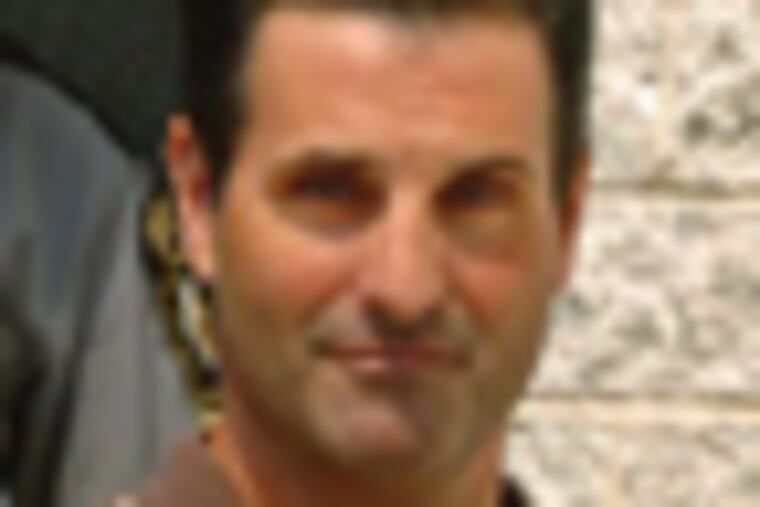Monacello turns witness in Ligambi case
It's official. Louis "Bent Finger Lou" Monacello, charged along with reputed mob boss Joseph Ligambi and 11 others in a racketeering case, is a cooperating witness.

It's official.
Louis "Bent Finger Lou" Monacello, charged along with reputed mob boss Joseph Ligambi and 11 others in a racketeering case, is a cooperating witness.
In a motion filed this week, federal prosecutors formally confirmed what underworld and law enforcement sources have been speculating about for the last six months.
"Louis Monacello . . . has pleaded guilty and will testify at trial as a cooperating witness for the government," prosecutors wrote in a motion that sought to have Monacello's former attorney, Joseph Santaguida, barred from representing another defendant in the case because of a potential conflict.
Santaguida, who is representing reputed mob underboss Joseph "Mousie" Massimino, said he would oppose the move to oust him.
The disclosure that Monacello, 45, had agreed to take the stand came as no surprise to the defendants or their attorneys.
"Ray Charles in a darkroom would have figured it out," quipped Edwin Jacobs Jr., Ligambi's attorney. "We can identify the obvious."
Monacello, like Ligambi and five co-defendants, was originally ordered held without bail after he and the others were arrested in May.
He was, prosecutors alleged, a "threat to the community." But six weeks later, and with little notice, the prosecution withdrew its opposition, and Monacello was freed.
Documents detailing those events and Monacello's plea agreement have been filed under seal and are not available for public scrutiny.
The onetime tough-talking mob associate is believed to be living in Ventnor, where he has a home. He has apparently vacated a home in the Packer Park section of South Philadelphia, where he had lived for several years.
The home, a posh townhouse, was around the corner from Ligambi's equally stylish residence.
Monacello's testimony is expected to bolster the gambling, extortion, and loansharking charges that are part of the pending racketeering case.
He has been described by authorities as the "point man" for jailed mobster George Borgesi in a Delaware County gambling and loansharking ring first targeted in 2007 by the Pennsylvania Attorney General's Office.
Monacello was sentenced to work release after pleading guilty to gambling charges in that case.
Authorities allege that he visited Borgesi in prison in Beckley, W.Va., to discuss the gambling operation and that he also met with Ligambi in South Philadelphia.
Borgesi is Ligambi's nephew. He was sentenced in 2001 to 12 years on racketeering charges. He was due to be released from prison early next year on those charges, but the new indictment could add eight to 10 years to his time behind bars.
Monacello's credibility is expected to be challenged by the defense. Sources have begun to describe him as a "wannabe wiseguy" who used Borgesi's name to enhance his standing.
"He was a loose cannon," said one. "Georgie didn't know half the things he was doing."
Authorities also have alleged that Monacello clashed with both Ligambi and Martin Angelina, another co-defendant in the case, over the Delaware County gambling operation.
Monacello also pleaded guilty to plotting to have Angelina beaten over a loansharking dispute.
Underworld sources have said Monacello was telling people he was not providing federal authorities with anything they didn't already know. But his testimony will likely be used to enhance and corroborate that of two other witnesses.
Frank "Frankie the Fixer" DiGiacomo was a collector and enforcer for Monacello who cooperated and wore a body wire for the state police and FBI.
The tapes he made, including conversations with Ligambi, are expected to be introduced as evidence.
Monacello also dealt with Anthony Aponick, a New York mob associate who befriended Borgesi when both were inmates in the federal prison in West Virginia.
After his release in 2003, Aponick has told authorities, he came to Philadelphia and met with Monacello at Borgesi's urging.
Aponick has said that they discussed gambling and loansharking businesses and that Borgesi, from prison, played a role in the operation.
Like Monacello, Aponick will have credibility problems. He was arrested on bank robbery charges in 2004, shortly after his release from prison. And he has been an on-again, off-again federal cooperator.
Aponick is identified as an associate of Joseph Massino, jailed boss of the Bonanno crime family.
Massino is also a cooperating federal witness.
In a related development in the Ligambi case, prosecutors, prison officials, and defense attorneys have reached an agreement that will allow Ligambi and five jailed co-defendants to meet daily in prison to go over evidence and prepare for trial.
They also will have greater access to files and a computer to review evidence.
Jacobs, Ligambi's attorney, had argued that prison restrictions and their inability to meet regularly had "rendered them helpless in defending themselves against the present indictment."
Jaocbs' motion also provided additional details about the investigation.
The case includes more than 14,000 secretly recorded conversations, including wiretaps on cellphones, listening devices hidden in bars and prison meeting rooms, and consensual recordings made by cooperating witnesses.
The locations where FBI bugs were planted included Lou's Crab Bar, a now-shuttered restaurant in the 1100 block of West Moyamensing Avenue, owned by co-defendant Massimino, and a meeting room at the federal prison in Beckley, where Borgesi was housed.
Lou's Crab Bar was described in the indictment as "a regular meeting place for members of the [mob]."
The 50-count racketeering indictment alleges that Ligambi headed a criminal organization that generated hundreds of thousands of dollars in illegal income through sports betting, video poker machines, loansharking, and extortion.
As he has argued continually since Ligambi's arrest, Jacobs again contended that the government was using trumped-up allegations of violence and the defendants' alleged ties to organized crime to force their pretrial detention.
"In a 50-count indictment that encompasses an 11-year investigation," Jacobs wrote in a related motion, "there is not a single act of physical violence or possession of a weapon charged."